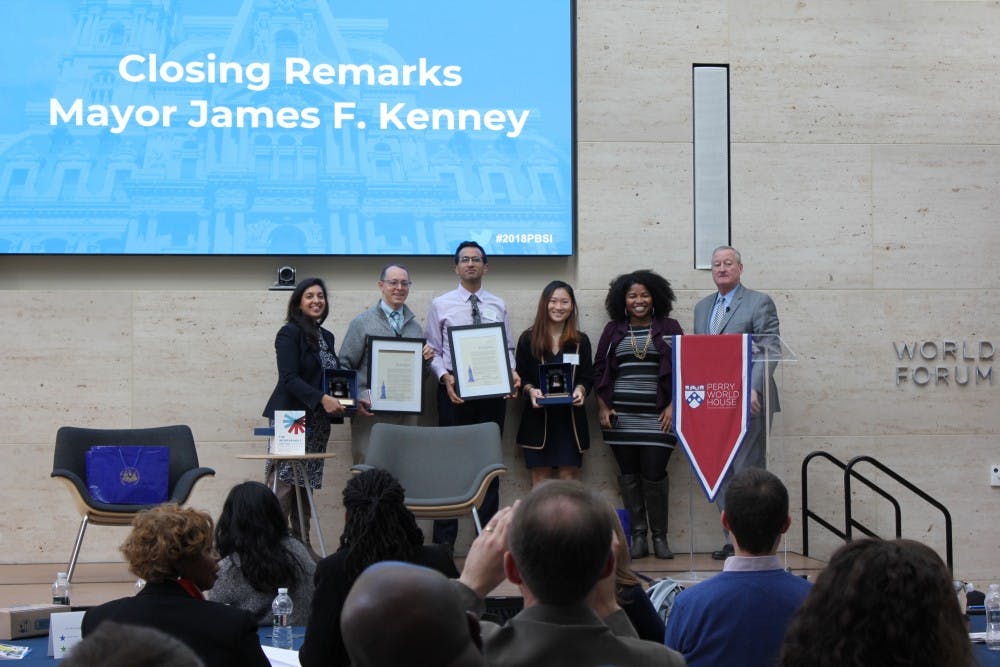Professors and students at Penn are working with the mayor's office to create low-cost and efficient policies to solve local issues.
The Philadelphia Behavioral Science Initiative was created with the purpose of bringing academics and government officials together to create data-driven, evidence-informed policies. Professors from Penn along with many other local institutions helped devise experiments to solve Philadelphia-specific problems such as littering and voting turnout.
“We try to partner with the city of Philadelphia to harness insights that are emerging from the behavioral sciences [and] social sciences, to help the city of Philadelphia better do its work,” said Daniel Hopkins, Penn professor of Political Science.
One of the projects PBSI is working on is the Zero Waste and Litter project, which Mayor Jim Kenney announced in 2017 and which has seen promising results.
“In one neighborhood we saw that distributing recycling bins with lids ended up with increasing the recycling tonnage that was collected by over half a ton each week," said Anjali Chainani, director of Policy in the Mayor’s Office.
College junior Justin Iannacone worked in City Hall last semester and helped the Zero Waste and Litter project strategize how best to incentivize people not to litter. To do so, he analyzed Philadelphia neighborhoods using software which integrated spatial and map analysis.
“We were testing to see, using behavioral science, what were the most effective ways to encourage people to stop littering and dumping trash,” he said.
Philosophy, Politics, and Economics professor Douglas Paletta also sought to work with Philadelphia and, through Hopkins and Chainani, he connected with the Office of Sustainability. The project he works on is called Beat the Heat, which aims to find the best ways to help people deal with overwhelming temperatures.
RELATED:
Philadelphia is the first city in U.S. to allow supervised drug injection sites
Penn meets with Phila. universities to discuss multi-million dollar dredge of Schuylkill River
Paletta said that, initially, project's team wanted to figure out the best way to have people stay at cooling centers long enough to lower their core body temperatures. However, when they did a survey of people dealing with heat problems, they found an issue with their original intention.
"It turned out [that] when it's really hot, people tend not to leave their homes,” Paletta said.
Looking ahead to the next election, another project that the PBSI is starting to work on is how to increase voter turnout in Philadelphia.
“We're going to be looking at how we can re-engage voters, specifically [those] who have voted in the past, but who have failed to show up in recent elections,” Chainani said.
The project will attempt to increase turnout through mailers.
“We're going to have the city send an official mailer," Hopkins said. "We're now in discussions with our colleagues in the city and the city commissioner's office to try to figure out what's the right kind of language that is likely to promote voter turnout among Philadelphia residents."
Hopkins said PBSI is a good opportunity for academics to test whether their theoretical ideas can make a difference.
"Much of the time, we don't get to test our ideas ... in a real world test case. Instead, we use surveys or we use online simulations," Hopkins said. "And so it's a really neat opportunity to take these ideas which we've been debating and see how this actually works in practice."
Last month, PBSI held a conference at Perry World House, here on Penn's campus.
“The best part about the conference is that it genuinely provided an opportunity to bring together academics, people working on the ground in the city, and nonprofits to talk through different issues and challenges and approaches,” Paletta said.
Palleta noted the importance of the PBSI as a space for collaboration.
“One of the goals of Penn is to have an impact in the greater Philadelphia area and GovLabPHL and the PBSI are clear ways of partnering interested and engaged academics with interested and engaged city officials,” he said. “And I just think the more of that the better. I think it tends to make for better research and tends to make for better policy when everything goes well.”









